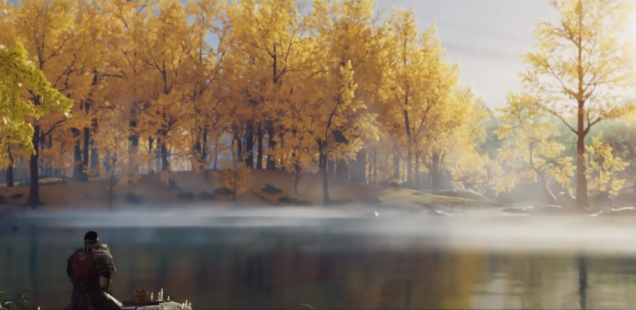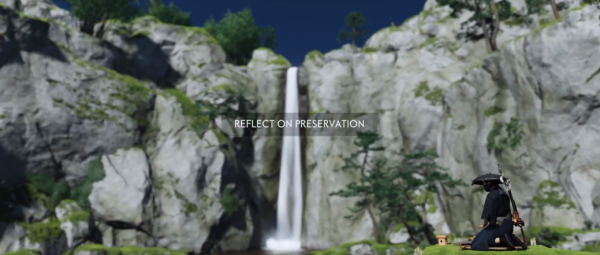
Will I Write Poetry on My Father’s Grave?
Emma Kostopolus on writing, mourning, and Ghost of Tsushima.
I was 24 years old when my father called to tell me he was probably going to die. I had just gotten out of a movie and was walking to my car when my phone rang. We text every day, but he never calls, so hearing each other’s voices was unsettling. He told me that over the last months he’d been doing endless scans and tests, and that he had a surgery scheduled to remove a large section of his right lung, because there was a mass. He hadn’t told me any of this prior because he didn’t want to worry me.
My relationship with my father is not particularly complicated on its face. We’re incredibly similar people: personable but prefer solitude, proud of our general self-sufficiency, and possessing an often unhealthy work ethic. We get along really well, because we share a sense of humor and taste in music and film. We’ve never really had any major fallings out; I had a very good childhood and I’m overall well-adjusted. The only thing I’m guilty of is putting him on a pedestal: my father is my favorite person who has ever existed. While he is not perfect, if I could be half the capable, generous person he is, I could die happy.
So, my own situation does not appear immediately similar to the life of Jin Sakai, the protagonist in the Sucker Punch game Ghost of Tsushima. The central conceit of the game is that Jin is forced to choose between the highly formalized life of the traditional samurai that has been passed onto him by his uncle, Lord Shimura, and a stealthy form of fighting that Japanese culture sees as dishonorable, but proves very effective at combating the invading Mongol army. By turning his back on his legacy as a samurai, Jin is disappointing his uncle, who he has placed on a pedestal and views as a father figure. Jin also carries a lot of guilt from being unable to stop the murder of his father as a teen, and feels that if he had just been a braver person, his father would still be alive.
Throughout the game, Jin struggles with feeling as though he is failing both his uncle and his father’s legacy, even as he does what he knows he has to in order to defend his home. Ghost of Tsushima demonstrates this emotional turmoil in several ways through cutscenes and in-game dialogue, but none more poignant than what might at first seem to be a throwaway mini-game: procedurally generated haiku writing. Throughout the game, including at pivotal moments of its narrative, the game asks Jin to stop and reflect on things like “legacy” or “grief” through writing a haiku. The game does not allow for total creative license: rather than letting the player cumbersomely type on a digital keyboard, the game provides a small selection of phrases for each line, so an appropriately thematic haiku is generated.

These haikus are prompted at times when Jin would naturally be reverent and reflective including, as the title of this piece suggests, when he is visiting his father’s grave. Trying to capture how I imagined Jin was feeling in these moments offers some of the most engaging roleplay of the game. While the way poetry is represented here does not always allow for the player to be engaged in deep emotional reflection, it does present a framework for Jin to deal with his own trauma and difficult feelings surrounding the father figures in his life. And from this, we can learn something.
Even though I have a really good relationship with my father who, as it turns out, was NOT dying and who I spent my 27th birthday with, there are things about me he doesn’t know. So as I reflect on my own father’s mortality after his brush with death and in the ever-present danger COVID represents for a 61 year old smoker, I consider the ways in which I will allow myself to mourn him. And the ways in which I already mourn how there are parts of me he does not have access to.
I’m asexual, aromantic, and agender. Even though he may not know these words or understand these concepts, my father is a very perceptive man who has probably figured at least some of this out, but I’ve never had a specific conversation with him about any of this. Not because I think he’d get upset or reject me, but because he would not understand that the person he thought was his daughter is simply his child, and that they will never get married (which is his dearest hope left for me in this world) or have children. I can’t tell my father about these things because I’m unprepared for a conversation wherein he is forced to reckon with me as an entirely different set of variables than he thought I was.
And so, as you’ve already probably figured out, to deal with these feelings, I write. Dad knows some of these feelings exist, but unlike when I write about less personal subjects, I don’t send him links. I won’t send him a link to this article, either. Because these writings, though they’re still public and performative in very specific ways, are a way for me to write through the things I cannot explain to him. I can’t share them with him, the person with whom I share everything, so I respond by writing it all down and screaming into the independent publishing void, because I need to tell someone.

So, what Ghost of Tsushima does, fundamentally, is present an avenue for Jin to do exactly what I’m doing with this piece: to reckon through the written word with the flaws of our fathers or the times we fail them (because it always somehow feels like it’s our fault, too). By looking at how Jin uses poetry to reckon with big, nebulous concepts like legacy and death, we can consider the benefits of trying to wrangle these things within ourselves by externalizing them through the written word. We cannot fully come to terms with things in the handful of syllables present in a haiku, but we could not come to terms with them if we were to write a novel either.
Distilling our concerns into manageable slivers of the self helps us see the ways in which we might be expressing them in our daily lives and gives us back some measure of power over them. They are no longer formless, nameless fears, but have titles and cadence that we may reshape at will. Though my writing is public and Jin’s is private, they both do the work of reclaiming our power over the situation: mine to express parts of myself, and Jin’s to assert his own desires as equally important to what others expect of him, while mourning a relationship that ultimately failed him. By doing this work, we’re using writing to help ourselves come to terms with the flaws of the fathers we’ve put on pedestals and finding a space where our admiration of them and our authentic selves can coexist. This piece therefore functions both as a meditation on how we can use writing to work through things and as a lived example of the praxis I’m preaching. Writing is not a panacea and shouldn’t replace professional care for serious concerns. But as part of a thoughtful system of management and progress through trauma, I think it has a lot of potential to be therapeutic, cathartic, and perhaps even revelatory.
Ghost of Tsushima ends with Jin stripped of his noble titles and disowned by his uncle, who attempts to kill him in order to restore the family’s honor. Jin must defeat his uncle, and then the game gives you the option to kill or spare him. While the choice is ultimately up to the player, I chose to spare Lord Shimura, because the symbolism of killing your father figure was ultimately too on the nose for me. Besides, Jin didn’t hate his uncle; he pitied him for being too myopic and unable to adapt to the needs of the current day. I think some day I’ll come to a similar conclusion.
Emma Kostopolus is a PhD candidate at the University of Kansas, where she studies how play can impact learning and writing. When not writing or teaching, she moonlights as a game designer; her latest very queer murder mystery can be found at oneshotjournal.com. All her thoughts, words, and games can be found on her Twitter.